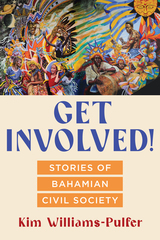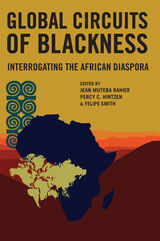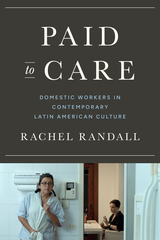223 books about Black people and 3
start with G
223 books about Black people and 3
223 books about Black people
3 start with G start with G
3 start with G start with G

Geologic Life
Inhuman Intimacies and the Geophysics of Race
Kathryn Yusoff
Duke University Press, 2024
In Geologic Life, Kathryn Yusoff theorizes the processes by which race and racialization emerged geologically. Examining both the history of geology as a discipline and ongoing mineral and resource extraction, Yusoff locates forms of imperial geology embedded in Western and Enlightenment thought and highlights how it creates anti-Black, anti-Indigenous, and anti-Brown environmental and racial injustices. Throughout, she outlines how the disciplines of geology and geography---and their conventions: surveying, identifying, classifying, valuing, and extracting—established and perpetuated colonial practices that ordered the world and people along a racial axis. Examining the conceptualization of the inhuman as political, geophysical, and paleontological, Yusoff unearths an apartheid of materiality as distinct geospatial forms. This colonial practice of geology organized and underpinned racialized accounts of space and time in ways that materially made Anthropocene Earth. At the same time, Yusoff turns to Caribbean, Indigenous, and Black thought to chart a parallel geologic epistemology of the "earth-bound" that challenges what and who the humanities have chosen to overlook in its stories of the earth. By reconsidering the material epistemologies of the earth as an on-going geotrauma in colonial afterlives, Yusoff demonstrates that race is as much a geological formation as a biological one.
[more]

Get Involved!
Stories of Bahamian Civil Society
Kim Williams-Pulfer
Rutgers University Press, 2024
Philanthropy is commonly depicted as a universal practice and is either valued for supporting community transformation or critiqued for limiting social justice. However, dominant definitions and even popular connotations tend to privilege wealthy Western approaches. Using the Caribbean as a rich site of observance and concentrating on the island nation-state of The Bahamas, Get Involved! uncovers the hidden and under-documented activities of “philanthropy from below,” revealing a broader conception of philanthropy and civil society, especially within Black and other historically marginalized populations. Kim Williams-Pulfer draws on narrative analysis from enslavement to the current post-post-colonial moment, depicting the repertoires and practices of primarily Afro-Bahamians through the stories emerging from history (including the transnational observations of Zora Neale Hurston, social movements, and political and social institution building), the arts (from Junkanoo, literature, and visual practices), to the lived experiences of contemporary civil society leaders. Get Involved! shows the long history and continued significance of civil society and philanthropic engagement in The Bahamas, the circum-Caribbean, and the wider African Diaspora.
Junkanoo is the national cultural festival of The Bahamas. It fosters a sense of community pride, identity, companionship, spirituality and unity. Watch a video about Junknoo:
https://www.youtube.com/watch?v=tnMpMesNb1Q&t=14s
Junkanoo is the national cultural festival of The Bahamas. It fosters a sense of community pride, identity, companionship, spirituality and unity. Watch a video about Junknoo:
https://www.youtube.com/watch?v=tnMpMesNb1Q&t=14s
[more]

Global Circuits of Blackness
Interrogating the African Diaspora
Edited by Jean Muteba Rahier, Percy C. Hintzen, and Felipe Smith
University of Illinois Press, 2010
Global Circuits of Blackness is a sophisticated analysis of the interlocking diasporic connections between Africa, Europe, the Caribbean, and the Americas. A diverse and gifted group of scholars delve into the contradictions of diasporic identity by examining at close range the encounters of different forms of blackness converging on the global scene.
Contributors examine the many ways blacks have been misrecognized in a variety of contexts. They also explore how, as a direct result of transnational networking and processes of friction, blacks have deployed diasporic consciousness to interpellate forms of white supremacy that have naturalized black inferiority, inhumanity, and abjection. Various essays document the antagonism between African Americans and Africans regarding heritage tourism in West Africa, discuss the interaction between different forms of blackness in Toronto's Caribana Festival, probe the impact of the Civil Rights movement in America on diasporic communities elsewhere, and assess the anxiety about HIV and AIDS within black communities. The volume demonstrates that diaspora is a floating revelation of black consciousness that brings together, in a single space, dimensions of difference in forms and content of representations, practices, and meanings of blackness. Diaspora imposes considerable flexibility in what would otherwise be place-bound fixities.
Contributors are Marlon M. Bailey, Jung Ran Forte, Reena N. Goldthree, Percy C. Hintzen, Lyndon Phillip, Andrea Queeley, Jean Muteba Rahier, Stéphane Robolin, and Felipe Smith.
[more]
READERS
Browse our collection.
PUBLISHERS
See BiblioVault's publisher services.
STUDENT SERVICES
Files for college accessibility offices.
UChicago Accessibility Resources
home | accessibility | search | about | contact us
BiblioVault ® 2001 - 2024
The University of Chicago Press









